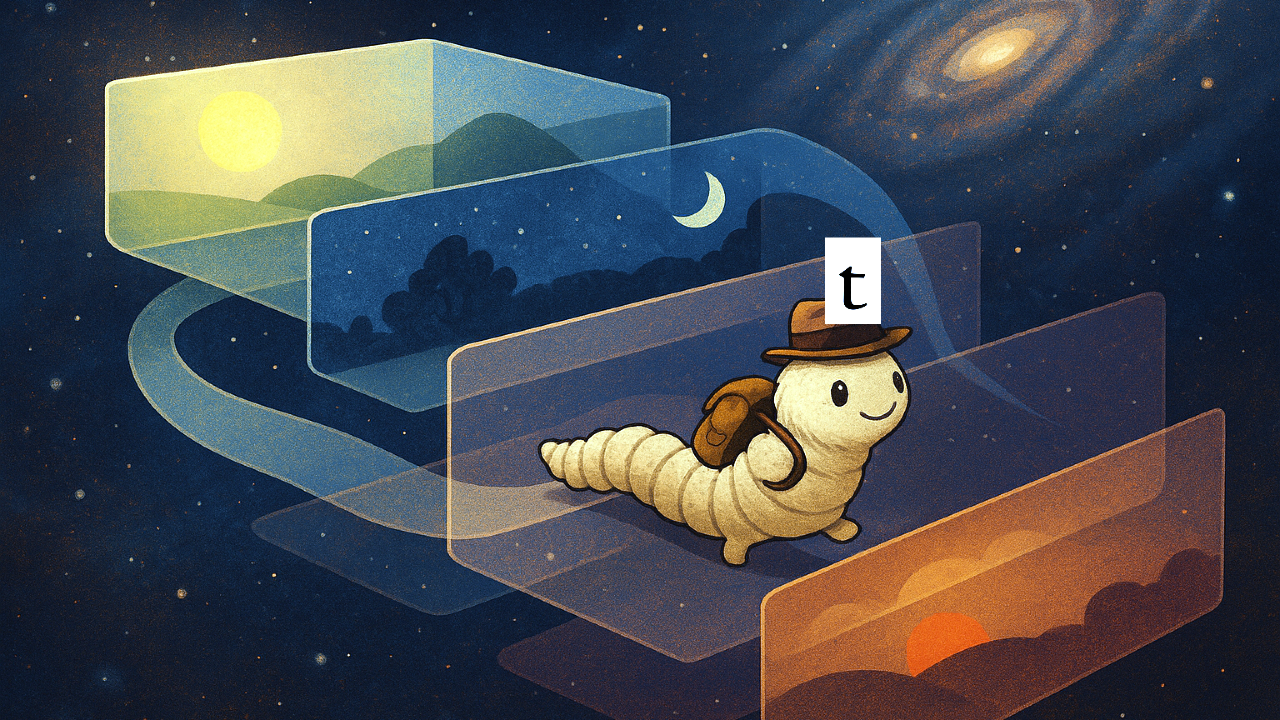t, for time

The Adventures of Time
Time is a polysemous thing with many activities. Time is causality, it is change, becoming, duration, succession, cycles, rhythm, temporality, time flows, time is now, present, futur and past. And sometimes mathematics tell us time is imaginary, an illusion, an arrow, a coordinate, a parameter t.
The diagnostic is that we have not been a good friend to time, so stunned by its continuous passage, cadencing our own thoughts with such familiarity, that we are still unable to distinguish its many faces.
Time Changed, our language did not
To make it a French affair, Lavoisier argued in the introduction to his Traité élémentaire de chimie (1789) that any progress in language is intrinsically linked to progress in science, as words link to how we think and therefore how we understand the world. Yet, as the french philosopher Étienne Klein points out, physics is still unable to speak with clarity on its nature, refusing to discriminate the many roles of time, confusing the flow of our human experience and time itself, sometimes even denying the philosopher's time (Einstein, 1949). So, how do we speak about time?
Parallel Views of Time
''All things originate from one another, and vanish into one another according to necessity, [...] in conformity with the order of time'' (Anaximander, On Nature 550 BCE)
Anaximander still summarize the essence of it and science has little substance to add. In most modern discussion time has little poesy and often is a background within which things happen.
What is less known is the arbitrariness of how Newton's equation came to condition physics' notion of time.
Formulating his laws of motion, Newton names his iterative variable 't', hence binding time to the evolution of his equation. There is no metaphysical motivation provided in his Philosophiæ Naturalis Principia Mathematica (1687) to justify this choice, rather it was simply a pragmatic mathematical step. Yet this association carried a massive conceptual weight. By assigning time a place on the same mathematical playing field as space, Newton installed a substantivalist notion of time: a universal entity, existing above or independently of things in the universe. Time 'contains' things, events, objects, as an absolute and separated stage. 't' stood not just for a parameter, but became a silent metaphysical assumption written into the framework of classical mechanics.
Simultaneously Leibniz developed a relationist notion of space and time opposing Newton's idea. Leibniz’s time arise from change, a continuous stream defining the order of events, it is a system of relations existing between objects and only meaningful relative to those relationships.
There are a few important turns in the history of physics where science provided us with alternatives, opportunities to think differently about an idea, the nature of a thing. With the corroded joints currently articulating science with philosophy, not enough thought is given by the general cohort of physicists, and consequently new generations of students, to the metaphysical dialogues and frameworks carried by the elected theories.
The Spatialization of Time
"Gentlemen! The views of space and time which I wish to lay before you, they are radical. Hence space by itself and time by itself, are doomed to fade away into mere shadows and only a kind of union of the two will preserve an independent reality." (Hermen Minkowski, 80th Assembly of German Natural Scientists and Physicians 1908)
In 1908, Hermen Minkowski provided the mathematics to mix space and time together into spacetime. Allowing to transform the spacetime of an observer to another with geometry.
In 1915, Einstein used Minkowski geometric spacetime to rewrite gravity as the bending and stretching of spacetime. Hence, gravity is the curvature itself of spacetime and the presence of mass alter space and time. Simultaneity was revealed to be relative. Duration became path-dependent. Time was no longer Newton's absolute, but it was still real.
Whereas the mathematics bends and curve, spacetime means very little outside the bonds of physics and is rather distant from our own experience. To let the metaphysics of time be substituted by physical time is reducing its many activities and ontological deliberation to its form manifested in our equations. Henri Bergson called this reduction as the 'spatialization' of time. Time simply becomes another dimension, akin to up, down, right and left. It becomes the quantitative measurements of clocks like a rule measure distance. Bergson saw this conception misses the essence of how we actually experience time. In his view, real time is a creative evolution, not a dimension within which things unfold but the very medium of change.
Unreal Time
But Einstein's revolution isn't the end of the matter. Modern physics continues its desubstantiation of time, towards an even less real apprehension of time. In general relativity, the Hamiltonian constraint suggests that the universe as a whole is timeless. And in quantum gravity attempts, such as string theory, time often vanishes altogether. The equations do not evolve in time; rather, they simply are. This has led some physicists to declare time an illusion—a unreal perception of the world.
Herein lies our philosophical roadblock: our experience is remarkably temporal, imbued by change and order, yet our most successful theories increasingly suggest time does not exist. Why this dissonance? The problem partially is in our language and conceptual logic. Our mathematics is a language of precision, but it is built upon assumptions that are themselves vague, like what is associated with our variable 't'. Treating "time" in equations like Schrödinger's as the same "time" that humans interact with can lead to paradoxes. On the other hand, the declaration that time is an illusion often comes from the absence of an entity that matches our current physical definition of time in the scientific formalism. But this says more about the tools of expression than the reality we attempt to describe. If we lack the framework to differentiate and think the many activities of time effectively, how can we expect physics to identify it successfully in the theories?
Theories are only partial windows on the world; science cannot claim to erase time altogether because our sense of it cannot be found in the equations. But to advance better dialogues and deliberation on the nature of time, we may need more than better, or unified, theories; we may need to reflect on the foundational meaning of its basic concepts ((e.g., order, causation, change) and the non-straightforward relationships between them.




